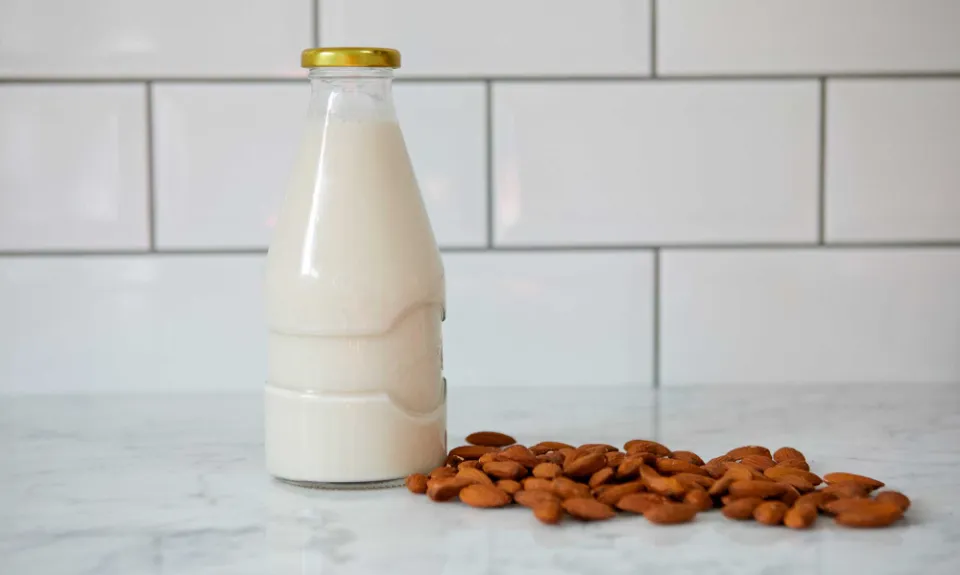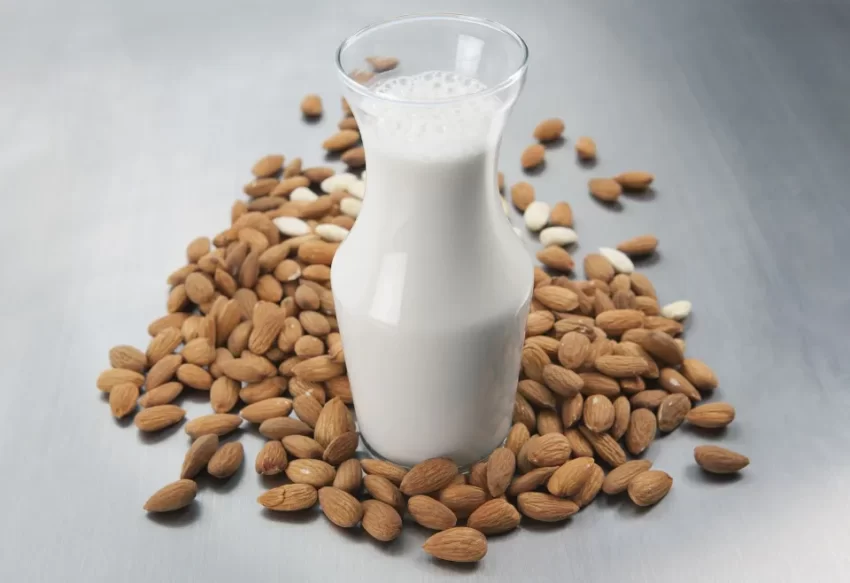Almond milk is a staple of several vegan diets. This plant-based milk has been hailed as the perfect flavorful substitute for dairy milk. Do you know does almond milk need to be refrigerated? Everything you need to know about storing almond milk is provided here.
Once you open almond milk—any kind of almond milk, including homemade almond milk— always refrigerate it.
In this article, I cover the essentials on the shelf life, storage, and spoilage of almond milk. Continue reading if that sounds interesting.
Table of Contents
Does Almond Milk Need to Be Refrigerated?
Yes, once opened, all almond milk must be refrigerated. The development of mold and bacteria that can spoil almond milk is slowed down by refrigeration.
Mycotoxins, which are produced by mold, have the potential to make you very ill from eating.
In order to prevent exposure to mycotoxin, the World Health Organization advises consumers to store food properly and not to keep it for long periods of time.
Also Read: Does Baileys Need to Be Refrigerated?
How Long Does Almond Milk Last?

The shelf life of almond milk depends on the type of almond milk and how well it is stored. Even when properly stored in the refrigerator, homemade almond milk or almond milk obtained locally and fresh doesn’t have any additives to extend its shelf life; instead, it only lasts for about five days.
Almond milk purchased from stores is frequently ultra-pasteurized, which is a heating and cooling procedure that eliminates bacteria and lengthens shelf life. It should remain fresh once opened for up to seven days if properly refrigerated.
The longest shelf life is for almond milk that is shelf stable. It typically keeps for one to two months if stored properly, and after being opened and refrigerated, it can keep for up to 10 days.
Remember that these are only recommendations because almond milk’s shelf life varies from brand to brand and is based on how well it is stored. While it’s important to keep these deadlines in mind, the real test is how the almond milk appears, smells, and tastes (more on that in a moment).
Related Post: How Long Does Powdered Milk Last?
Will Almond Milk Go Bad If You Don’t Refrigerate It?
Normal pasteurized almond milk is perishable and will go bad if you don’t refrigerate it once it is opened.
But until the use-by date indicated on the package, you can keep unopened bottles of shelf-stable almond milk at room temperature in your pantry.
Milk’s shelf life is increased by refrigeration, which keeps bacteria that cause spoilage inactive.
So, if you do not refrigerate it, you will be encouraging the bacteria to multiply faster, hence shortening the milk’s shelf life.
How to Store Unopened Almond Milk
It depends on the almond milk and where it is from as to how to store it in the best possible way. If you’re fortunate enough to have a nearby purveyor who makes fresh almond milk, keep it in the fridge. The same holds true for any almond milk you purchase that has already been chilled.
Almond milk that is shelf-stable, which typically comes in unrefrigerated rectangular boxes, can be stored in your pantry or any other cool, dark location away from heat and light.
Just recall where you found the almond milk as an easy way to remember. If it was in a refrigerator when you purchased it, keep it there; if it wasn’t, put it in your pantry.
Can You Freeze Homemade Almond Milk?
When making almond milk at home, you may not have access to sterilization or pasteurization equipment to help you preserve your final product.
As a result, freezing is the best way to preserve and keep homemade almond milk fresh.
After defrosting, your almond milk won’t have the same consistency, color, or flavor. After thawing, the fat content separates from water, and almond milk appears to have a grainy texture.
Try freezing your almond milk in anice cube tray if you want to have easy-to-use portion sizes. A standard ice cube tray holds one bit of liquid per cell.
To make serving-size portions simple to access, place the cubes in a freezer bag that can be resealed after they have completely frozen.
How to Tell If Almond Milk is Bad?

Here’s what to do to check if your almond milk is spoiled:
Examine the Carton
Throw away the milk if the carton is puffy, bloated, or leaky. Although the dairy-free milk may not necessarily be spoiled, something is very wrong in this situation. Safer is preferable to sorry.
Give the carton a shake, pour yourself a glass, and carry on if everything is fine.
Check Milk’s Appearance
Look out for any suspicious-looking black spots, discolorations, or other conditions. Check the texture of the beverage, too.
Almond milk isn’t thick, and it’s not supposed to be thick unless it’s homemade and you leave the pulp in. Store-bought almond milk is mostly water, and its consistency is quite similar to milk’s.
You should discard anything slimy or lumpy.
INFO
Depending on the quantity of thickeners added, some brands of almond milk are a little thicker than others.
Give It a Sniff
The aroma of fresh, nutty almond milk. There will be a hint of sweetness if it is a sweetened variety. If it has flavor, such as a flavoring like “salted caramel,”, vanilla), some of that flavor will be present in the smell. When you take a whiff of your almond milk, you should detect that.
If it smells sour, old, or “funny,” it’s time for it to go.
Take a Sip
Take a small sip if everything appears to be going well so far.
Pour your almond milk down the drain if it tastes sour or off in any way. If not, consider its taste when deciding if it is suitable for use.
Remember About Shelf Life
Of course, going through the process outlined above makes sense only if the date is within a reasonable period.
Simply throw away almond milk that has been opened for more than two weeks. Same goes for varieties that are shelf-stable and have passed their best-by dates by three months or those that are refrigerated and have passed their date by more than two weeks.
What If I Drank Bad Almond Milk?
While it’s possible to consume expired almond milk and go unnoticed, it’s also possible that you’ll experience diarrhea, vomiting, or a combination of those symptoms if you do. Mycotoxins, which mold produces, frequently cause digestive problems.
Keep in mind that we sometimes accidentally ingest mold, and in small amounts, it’s pretty harmless, so this isn’t something you need to worry too much about.
Naturally, drinking a big gulp of almond milk that is way past its prime will probably taste pretty bad, so it’s important to store it properly and check to see if it’s still fresh.
Bottom Line: Does Almond Milk Need to Be Refrigerated
Almond milk‘s shelf life can be extended by storing it properly, as with all foods. The shelf life of homemade almond milk in the refrigerator is roughly five days.
Almond milk bought from the refrigerated section of your market will last in your fridge for about seven to 10 days.
After opening, shelf-stable almond milk will keep for one to two months in your pantry and up to ten days in the refrigerator.
Read More:
FAQs
Does Refrigerated Almond Milk Go Bad?
Yes, almond milk spoils even if it hasn’t been opened.
What Are Risks of Drinking Expired Almond Milk?
While you could drink expired almond milk and not even notice, it could also lead to nausea, vomiting, diarrhea or a combination of those symptoms.

